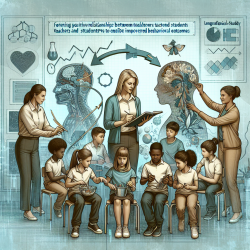In the realm of special education and online therapy, continuous learning and application of evidence-based practices are vital for improving the well-being of adolescents facing chronic health conditions. A recent study titled "Development and effects of salutogenesis program for adolescents with moyamoya disease: A randomized controlled trial" offers valuable insights that can enhance the skills of practitioners working with adolescents suffering from moyamoya disease.
Moyamoya disease is a rare, progressive cerebrovascular disorder characterized by the narrowing of arteries at the base of the brain, leading to the formation of a network of tiny blood vessels. Adolescents with this condition often face significant psychological and physical challenges, including recurrent transient ischemic attacks (TIA) and cognitive impairments.
The research by Yeom and Oh (2023) explores the effectiveness of a salutogenesis-based program aimed at improving the health and quality of life of adolescents with moyamoya disease. Salutogenesis, a concept introduced by Antonovsky, focuses on factors that support human health and well-being, rather than on factors that cause disease.
Key Findings of the Study
The study involved 48 participants who were divided into an intervention group and a control group. The intervention group underwent seven sessions of a salutogenesis program, while the control group received a single session of disease education. The outcomes measured included knowledge of moyamoya disease, social support, sense of coherence, health behaviors, stress, depression, subjective health status, frequency of ischemic symptoms, and quality of life.
Positive Outcomes
The salutogenesis program yielded several positive outcomes for the intervention group:
- Increased Knowledge: Participants gained a deeper understanding of moyamoya disease, which is crucial for effective self-management.
- Enhanced Social Support: The program fostered a supportive community among adolescents, which is essential for emotional well-being.
- Improved Sense of Coherence: Adolescents developed a stronger sense of coherence, meaning they found life more comprehensible, manageable, and meaningful.
- Healthier Behaviors: Participants adopted healthier behaviors, which are vital for managing the symptoms of moyamoya disease.
- Reduced Stress: The program effectively reduced stress levels among participants.
- Better Subjective Health Status: Adolescents reported an improvement in their perceived health status.
- Enhanced Quality of Life: Overall, the quality of life of participants improved significantly.
Implications for Practitioners
For practitioners working in online therapy and special education, the findings of this study offer actionable insights:
- Implement Salutogenesis Principles: Integrating the principles of salutogenesis into therapy programs can help adolescents with moyamoya disease and other chronic conditions develop resilience and improve their overall well-being.
- Foster Social Support: Creating a supportive community among adolescents can enhance their emotional health and provide a sense of belonging.
- Promote Health Education: Educating adolescents about their condition empowers them to take control of their health and make informed decisions.
- Focus on Stress Management: Incorporating stress management techniques, such as progressive muscle relaxation, can significantly reduce stress levels and improve mental health.
- Tailor Interventions: Personalizing interventions to address the unique needs of each adolescent can lead to more effective outcomes.
Encouraging Further Research
While the salutogenesis program showed promising results, the study also highlighted areas that require further research. For instance, the program did not significantly impact depression levels or the frequency of ischemic symptoms. Future research should explore longer intervention periods and additional psychological support to address these aspects.
Conclusion
The research by Yeom and Oh (2023) underscores the importance of holistic, health-promoting interventions for adolescents with moyamoya disease. By adopting and adapting the salutogenesis program, practitioners can make a meaningful difference in the lives of these adolescents, helping them navigate their health challenges with greater resilience and improved quality of life.
To read the original research paper, please follow this link: Development and effects of salutogenesis program for adolescents with moyamoya disease: A randomized controlled trial.










